人教版七年级上册Unit 6 Do you like bananas? Section A (Grammar Focus~3c) 课件 (共20张PPT)
文档属性
| 名称 | 人教版七年级上册Unit 6 Do you like bananas? Section A (Grammar Focus~3c) 课件 (共20张PPT) | 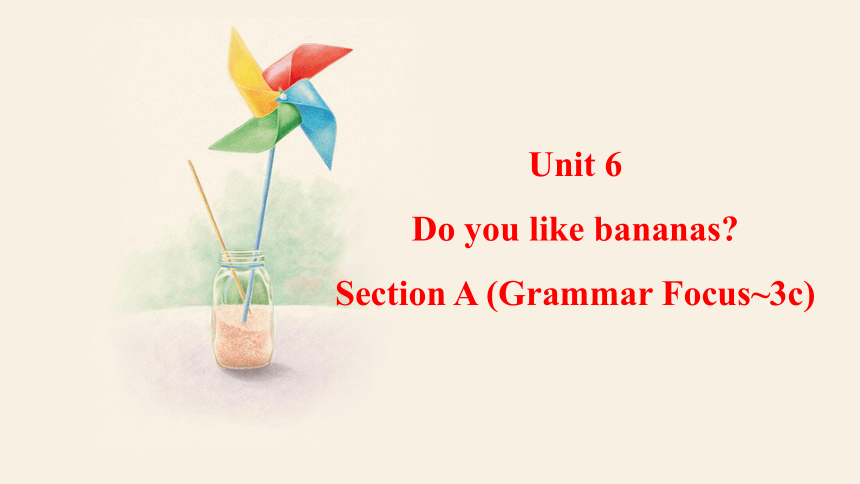 | |
| 格式 | pptx | ||
| 文件大小 | 1.2MB | ||
| 资源类型 | 教案 | ||
| 版本资源 | 人教新目标(Go for it)版 | ||
| 科目 | 英语 | ||
| 更新时间 | 2023-12-12 14:15:11 | ||
图片预览

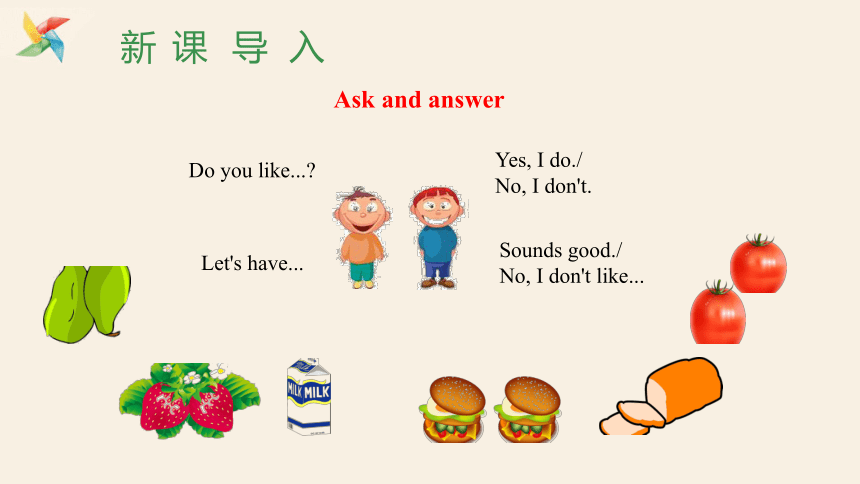


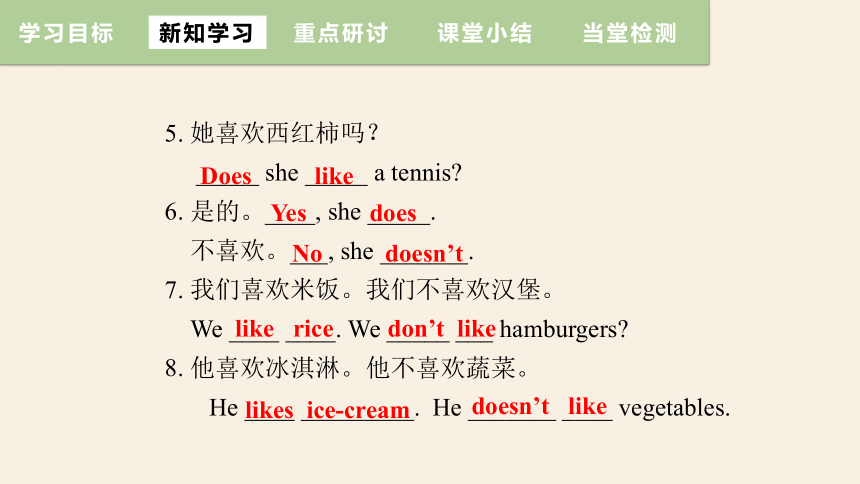
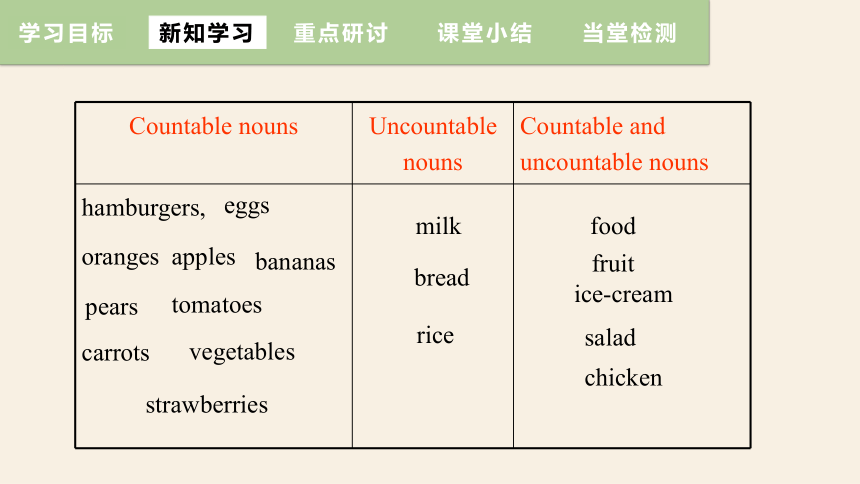
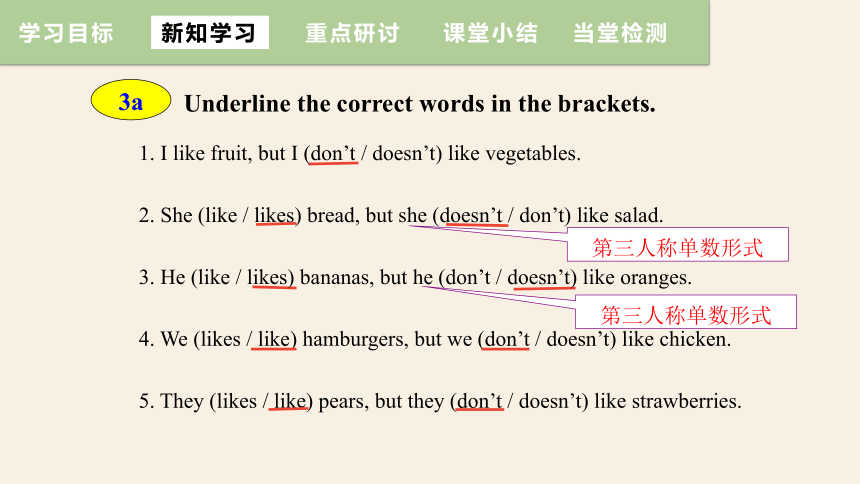
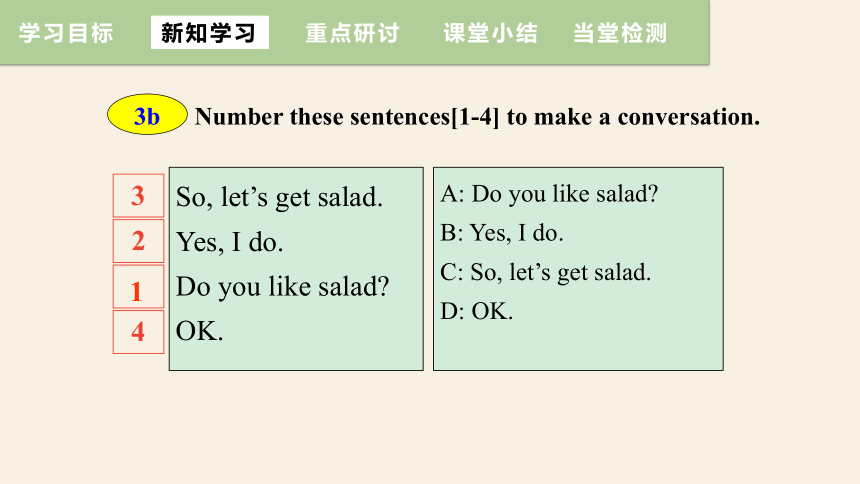
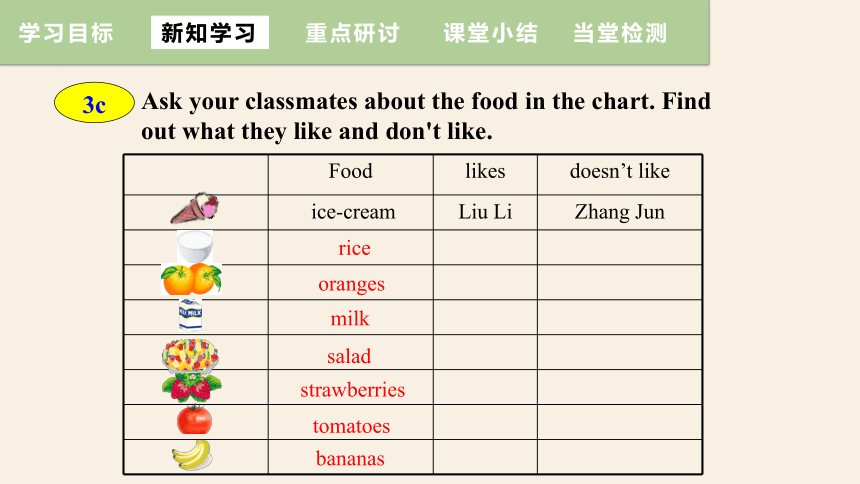
文档简介
(共20张PPT)
Unit 6
Do you like bananas
Section A (Grammar Focus~3c)
新
课
导
入
Do you like...
Yes, I do./
No, I don't.
Let's have...
Sounds good./
No, I don't like...
Ask and answer
Language Goal
新知学习
课堂小结
当堂检测
学习目标
重点研讨
1.能熟记并正确运用本课时出现的新单词和短语
2.能掌握可数名词与不可数名词的用法及可数
名词复数的变化规律
3.能灵活运用like的句型
新知学习
课堂小结
当堂检测
学习目标
重点研讨
你喜欢色拉吗?
____ you ____ salad
2. 是的。____, I ____.
不,不喜欢。_____, I______.
3. 他们喜欢梨吗?
____ _____ like pears
4. 是的。____, they ____.
不喜欢。___, they ______.
Do like
Do they
Yes do
No don’t
No don’t
Yes do
重点句型(Grammar focus)
新知学习
课堂小结
当堂检测
学习目标
重点研讨
5. 她喜欢西红柿吗?
_____ she _____ a tennis
6. 是的。____, she _____.
不喜欢。___, she _______.
7. 我们喜欢米饭。我们不喜欢汉堡。
We ____ ____. We _____ ___ hamburgers
8. 他喜欢冰淇淋。他不喜欢蔬菜。
He ____ _________. He _______ ____ vegetables.
Yes does
doesn’t like
like rice
likes ice-cream
No doesn’t
don’t like
Does like
新知学习
课堂小结
当堂检测
学习目标
重点研讨
Countable nouns Uncountable nouns Countable and uncountable nouns
hamburgers,
apples
bananas
pears
carrots
tomatoes
vegetables
strawberries
eggs
oranges
milk
bread
rice
food
fruit
ice-cream
salad
chicken
新知学习
课堂小结
当堂检测
学习目标
重点研讨
3a
Underline the correct words in the brackets.
第三人称单数形式
1. I like fruit, but I (don’t / doesn’t) like vegetables.
2. She (like / likes) bread, but she (doesn’t / don’t) like salad.
3. He (like / likes) bananas, but he (don’t / doesn’t) like oranges.
4. We (likes / like) hamburgers, but we (don’t / doesn’t) like chicken.
5. They (likes / like) pears, but they (don’t / doesn’t) like strawberries.
第三人称单数形式
新知学习
课堂小结
当堂检测
学习目标
重点研讨
3b
Number these sentences[1-4] to make a conversation.
So, let’s get salad.
Yes, I do.
Do you like salad
OK.
1
3
2
A: Do you like salad
B: Yes, I do.
C: So, let’s get salad.
D: OK.
4
新知学习
课堂小结
当堂检测
学习目标
重点研讨
3c
Ask your classmates about the food in the chart. Find out what they like and don't like.
Food likes doesn’t like
ice-cream Liu Li Zhang Jun
rice
oranges
milk
salad
strawberries
tomatoes
bananas
新知学习
课堂小结
当堂检测
学习目标
重点研讨
Pair work
Do you like...
Yes, I do.
Do you like...
No, I don't.
新知学习
课堂小结
当堂检测
学习目标
重点研讨
Language points
1. chicken n. 鸡肉
e.g. I like chicken and vegetables for dinner.
我晚餐喜欢吃鸡肉和蔬菜。
My grandmother has many chickens.
我奶奶养了许多鸡。
新知学习
课堂小结
当堂检测
学习目标
重点研讨
chicken的用法
(1) chicken作为 (可数名词/不可数名词) , 意为“鸡肉”, 无单复数之分。
(2) chicken作为 (可数名词/不可数名词) , 意为“鸡; 小鸡”, 其复数形式为chickens。
答案: (1) 不可数名词 (2) 可数名词
新知学习
课堂小结
当堂检测
学习目标
重点研讨
2. so conj. (引出评论或问题)那么
e.g: So, let’s get salad. 那么, 我们拿沙拉吧。
So, let’s meet next week.
那么, 让我们下周见吧。
1) so作连词, 意为“如此; 那么”。
eg. So, let’s go to the next shop.
那么我们去下一家商店吧。
2) so作连词, 还可意为“因此; 所以”, 可以与because进行同义句的转换, 但两者不能同时应用于一个句子里面。
eg. Tom is late for school, so his teacher is a little angry.
→Because Tom is late for school, his teacher is a little angry.
汤姆上学迟到了, 所以他的老师有点生气。
新知学习
课堂小结
当堂检测
学习目标
重点研讨
3. 可数名词和不可数名词
英语中的普通名词分为两类: 可数名词和不可数名词。
可数名词 不可数名词
定义 可以计数的名词 不可以计数的名词
不同点 (1) 有复数形式。 (2) 可用不定冠词及数词等来修饰。 (3) 可数名词作主语时, 谓语动词的数由可数名词的数来决定 (1) 没有复数形式。
(2) 不可用不定冠词及数词等来修饰。
(3) 不可数名词作主语时, 谓语动词用单数形式
新知学习
课堂小结
当堂检测
学习目标
重点研讨
可数名词复数的变化规则
构成方式 例 词
一般在词尾加-s desk→desks
以s, x, sh, ch结尾的加-es brush→brushes watch→watches
以“辅音字母+y”结尾的词, 把y变为i, 再加-es story→stories strawberry→strawberries
以o结尾的可数名词 有生命的加-es potato→potatoes
tomato→tomatoes
无生命的加-s piano→pianos
以f或fe结尾的词, 一般把f或fe改为v, 再加-es wolf→wolves wife→wives
新知学习
课堂小结
当堂检测
学习目标
重点研讨
少数可数名词变复数是不规则的, 如man→men, woman→women, child→children, sheep→sheep, foot→feet, tooth→teeth, mouse→mice, Chinese→Chinese等。
新知学习
课堂小结
当堂检测
学习目标
重点研讨
4. like
like作动词,意为“喜欢”,它后面接名词、代词宾格、动词不定式
或v ing形式。若主语为第三人称单数时,like后面要加“ s”。
eg: I have two pens.I like them.我有两支钢笔,我喜欢它们。
I like playing basketball.我喜欢打篮球。
He likes ice cream.他喜欢冰激凌。
询问某人的喜好,通常用一般疑问句“Do/Does+主语+like+…?”
肯定回答用:Yes,主语+do/does.
否定回答用:No,主语+don't/doesn't。
新知学习
课堂小结
当堂检测
学习目标
重点研讨
【注意】do/does为助动词。
eg:—Do you like the chicken?你喜欢鸡肉吗?
—Yes,I do.是的,我喜欢。
—Does he like the pen?他喜欢这支钢笔吗?
—No,he doesn‘t.不,他不喜欢。
新知学习
课堂小结
当堂检测
学习目标
重点研讨
Unit 6
Section A (Grammar Focus~3c)
句型Does... like... 及答语:
—Does... like...
—Yes, he/she does./
No, he/she doesn’t.
提建议句型:
How/What about...
Let‘s...
新知学习
课堂小结
当堂检测
学习目标
重点研讨
句型转换。
1.Bob and Bill like apples.(改为否定句)
2.Mary Smith likes oranges.(改为一般疑问句)
3.Mary likes ice cream.(改为否定句)
4.They don't like basketball.(改为肯定句)
5.She has a banana.(改为复数句)
Bob and Bill don't like apples.
Does Mary Smith like oranges
Mary doesn't like ice cream.
They like basketball.
They have bananas.
Unit 6
Do you like bananas
Section A (Grammar Focus~3c)
新
课
导
入
Do you like...
Yes, I do./
No, I don't.
Let's have...
Sounds good./
No, I don't like...
Ask and answer
Language Goal
新知学习
课堂小结
当堂检测
学习目标
重点研讨
1.能熟记并正确运用本课时出现的新单词和短语
2.能掌握可数名词与不可数名词的用法及可数
名词复数的变化规律
3.能灵活运用like的句型
新知学习
课堂小结
当堂检测
学习目标
重点研讨
你喜欢色拉吗?
____ you ____ salad
2. 是的。____, I ____.
不,不喜欢。_____, I______.
3. 他们喜欢梨吗?
____ _____ like pears
4. 是的。____, they ____.
不喜欢。___, they ______.
Do like
Do they
Yes do
No don’t
No don’t
Yes do
重点句型(Grammar focus)
新知学习
课堂小结
当堂检测
学习目标
重点研讨
5. 她喜欢西红柿吗?
_____ she _____ a tennis
6. 是的。____, she _____.
不喜欢。___, she _______.
7. 我们喜欢米饭。我们不喜欢汉堡。
We ____ ____. We _____ ___ hamburgers
8. 他喜欢冰淇淋。他不喜欢蔬菜。
He ____ _________. He _______ ____ vegetables.
Yes does
doesn’t like
like rice
likes ice-cream
No doesn’t
don’t like
Does like
新知学习
课堂小结
当堂检测
学习目标
重点研讨
Countable nouns Uncountable nouns Countable and uncountable nouns
hamburgers,
apples
bananas
pears
carrots
tomatoes
vegetables
strawberries
eggs
oranges
milk
bread
rice
food
fruit
ice-cream
salad
chicken
新知学习
课堂小结
当堂检测
学习目标
重点研讨
3a
Underline the correct words in the brackets.
第三人称单数形式
1. I like fruit, but I (don’t / doesn’t) like vegetables.
2. She (like / likes) bread, but she (doesn’t / don’t) like salad.
3. He (like / likes) bananas, but he (don’t / doesn’t) like oranges.
4. We (likes / like) hamburgers, but we (don’t / doesn’t) like chicken.
5. They (likes / like) pears, but they (don’t / doesn’t) like strawberries.
第三人称单数形式
新知学习
课堂小结
当堂检测
学习目标
重点研讨
3b
Number these sentences[1-4] to make a conversation.
So, let’s get salad.
Yes, I do.
Do you like salad
OK.
1
3
2
A: Do you like salad
B: Yes, I do.
C: So, let’s get salad.
D: OK.
4
新知学习
课堂小结
当堂检测
学习目标
重点研讨
3c
Ask your classmates about the food in the chart. Find out what they like and don't like.
Food likes doesn’t like
ice-cream Liu Li Zhang Jun
rice
oranges
milk
salad
strawberries
tomatoes
bananas
新知学习
课堂小结
当堂检测
学习目标
重点研讨
Pair work
Do you like...
Yes, I do.
Do you like...
No, I don't.
新知学习
课堂小结
当堂检测
学习目标
重点研讨
Language points
1. chicken n. 鸡肉
e.g. I like chicken and vegetables for dinner.
我晚餐喜欢吃鸡肉和蔬菜。
My grandmother has many chickens.
我奶奶养了许多鸡。
新知学习
课堂小结
当堂检测
学习目标
重点研讨
chicken的用法
(1) chicken作为 (可数名词/不可数名词) , 意为“鸡肉”, 无单复数之分。
(2) chicken作为 (可数名词/不可数名词) , 意为“鸡; 小鸡”, 其复数形式为chickens。
答案: (1) 不可数名词 (2) 可数名词
新知学习
课堂小结
当堂检测
学习目标
重点研讨
2. so conj. (引出评论或问题)那么
e.g: So, let’s get salad. 那么, 我们拿沙拉吧。
So, let’s meet next week.
那么, 让我们下周见吧。
1) so作连词, 意为“如此; 那么”。
eg. So, let’s go to the next shop.
那么我们去下一家商店吧。
2) so作连词, 还可意为“因此; 所以”, 可以与because进行同义句的转换, 但两者不能同时应用于一个句子里面。
eg. Tom is late for school, so his teacher is a little angry.
→Because Tom is late for school, his teacher is a little angry.
汤姆上学迟到了, 所以他的老师有点生气。
新知学习
课堂小结
当堂检测
学习目标
重点研讨
3. 可数名词和不可数名词
英语中的普通名词分为两类: 可数名词和不可数名词。
可数名词 不可数名词
定义 可以计数的名词 不可以计数的名词
不同点 (1) 有复数形式。 (2) 可用不定冠词及数词等来修饰。 (3) 可数名词作主语时, 谓语动词的数由可数名词的数来决定 (1) 没有复数形式。
(2) 不可用不定冠词及数词等来修饰。
(3) 不可数名词作主语时, 谓语动词用单数形式
新知学习
课堂小结
当堂检测
学习目标
重点研讨
可数名词复数的变化规则
构成方式 例 词
一般在词尾加-s desk→desks
以s, x, sh, ch结尾的加-es brush→brushes watch→watches
以“辅音字母+y”结尾的词, 把y变为i, 再加-es story→stories strawberry→strawberries
以o结尾的可数名词 有生命的加-es potato→potatoes
tomato→tomatoes
无生命的加-s piano→pianos
以f或fe结尾的词, 一般把f或fe改为v, 再加-es wolf→wolves wife→wives
新知学习
课堂小结
当堂检测
学习目标
重点研讨
少数可数名词变复数是不规则的, 如man→men, woman→women, child→children, sheep→sheep, foot→feet, tooth→teeth, mouse→mice, Chinese→Chinese等。
新知学习
课堂小结
当堂检测
学习目标
重点研讨
4. like
like作动词,意为“喜欢”,它后面接名词、代词宾格、动词不定式
或v ing形式。若主语为第三人称单数时,like后面要加“ s”。
eg: I have two pens.I like them.我有两支钢笔,我喜欢它们。
I like playing basketball.我喜欢打篮球。
He likes ice cream.他喜欢冰激凌。
询问某人的喜好,通常用一般疑问句“Do/Does+主语+like+…?”
肯定回答用:Yes,主语+do/does.
否定回答用:No,主语+don't/doesn't。
新知学习
课堂小结
当堂检测
学习目标
重点研讨
【注意】do/does为助动词。
eg:—Do you like the chicken?你喜欢鸡肉吗?
—Yes,I do.是的,我喜欢。
—Does he like the pen?他喜欢这支钢笔吗?
—No,he doesn‘t.不,他不喜欢。
新知学习
课堂小结
当堂检测
学习目标
重点研讨
Unit 6
Section A (Grammar Focus~3c)
句型Does... like... 及答语:
—Does... like...
—Yes, he/she does./
No, he/she doesn’t.
提建议句型:
How/What about...
Let‘s...
新知学习
课堂小结
当堂检测
学习目标
重点研讨
句型转换。
1.Bob and Bill like apples.(改为否定句)
2.Mary Smith likes oranges.(改为一般疑问句)
3.Mary likes ice cream.(改为否定句)
4.They don't like basketball.(改为肯定句)
5.She has a banana.(改为复数句)
Bob and Bill don't like apples.
Does Mary Smith like oranges
Mary doesn't like ice cream.
They like basketball.
They have bananas.
同课章节目录
- starters 预备篇(2012秋审查)
- Unit 1 Good morning !
- Unit 2 What’s this in English?
- Unit 3 What color is it ?
- Unit 1 My name's Gina.
- Section A
- Section B
- Unit 2 This is my sister.
- Section A
- Section B
- Unit 3 Is this your pencil?
- Section A
- Section B
- Unit 4 Where's my schoolbag?
- Section A
- Section B
- Unit 5 Do you have a soccer ball?
- Section A
- Section B
- Unit 6 Do you like bananas?
- Section A
- Section B
- Unit 7 How much are these socks?
- Section A
- Section B
- Unit 8 When is your birthday?
- Section A
- Section B
- Unit 9 My favorite subject is science.
- Section A
- Section B
